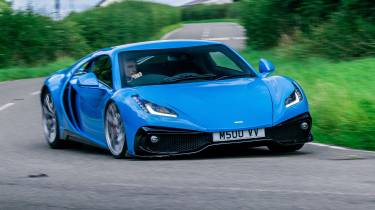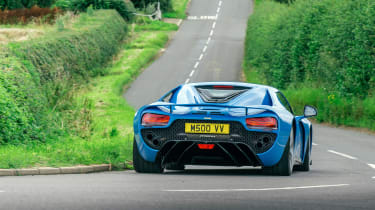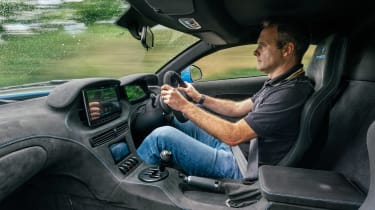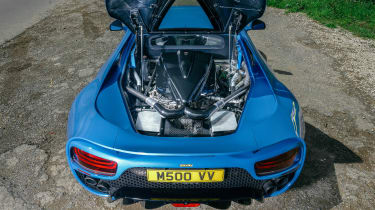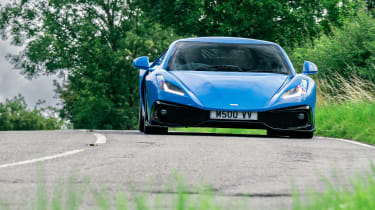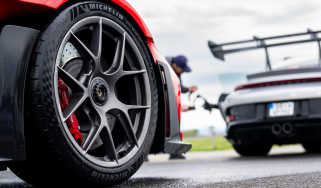Noble M500 prototype 2023 review – junior supercar targets Maserati MC20
Noble’s new 506bhp V6-powered M500 is gearing up to challenge the establishment with its own unique take on the supercar formula. We drive the prototype
Any journalist fortunate enough to have arrived in Maranello to review a Ferrari will know the drill. The flutter of excitement as you pass beneath that famous arch, the rising tension as you look at the impossibly tight schedule for the day, then the mad southerly dash to the road that any committed reader will recognise, with its foliage-encased hairpins at the bottom and more open corners with far-reaching vistas as it climbs. Add in an F140-series V12, with its idiosyncratic gurgle and scream, plus the sound of tortured tyres, and it’s an experience as strong as when a child gets to decide the appropriate ratio of concentrate to water in their juice drink.
Continuing the mind-association game, testing a Noble has no less clarity. Rutland lanes, green, fast and flowing; all those little villages with the suffixes of -oadby, -thorpe and -ville; and whatever the case in more recent years, forever the dry rasp of a Ford V6, overlaid with the whistle, chuff and sneeze of two hard-working turbos. Less romantic, granted, but in its own way equally as locked down in my subconscious as any other car-and-place combination. It’s been nearly 20 years since a development Noble with a Ford engine pounded these lanes, but the hope is those glory days of the early noughties are back, because Noble is returning with this car, the M500.
More reviews
Group tests
- Alpine A290 v Alpine A110 – how much DNA do they really share?
- Ariel Atom 4R v Caterham Seven ‘evo25’: power-to-weight heroes go head-to-head
- Caterham Super Seven 600 v Super Seven 2000
- Levante v T1
- Corvette Stingray v Porsche Cayman GTS v Audi R8 RWD
- Great Ferrari hypercars driven: 288 GTO, F40, F50 and Enzo head-to-head
- Hardcore Ferrari V8 specials go head-to-head
- Lamborghini Aventador Ultimae v Lamborghini Countach
- Lotus Emira v Morgan Plus Four – four-cylinder Brits go head-to-head
- Toyota GR86 v BBR Mazda MX-5: supercharged drop-top battles sports coupe
In-depth reviews
- Abarth 600e 2025 review – Italy gives the Alpine A290 something to worry about
- Alpine A110 review – distinctive, lightweight and unforgettable to drive
- Audi R8 (2015 - 2024) review – the ultimate soft-focus supercar
- Bentley Continental R Mulliner: review, history and specs
- BMW 5-series review – is this still Munich’s anchor model?
- BMW 1-series review – Munich’s Audi A3 rival gains focus
Long term tests
- Abarth 695C Turismo Fast Fleet test – 10,000 miles in the Italian hot hatch
- Alfa Romeo Giulia Veloce Fast Fleet test – 7000 miles in the sharp Italian saloon
- Alpina B10: end of term report
- Alpina B10
- Ford Mustang GT
- Ford Mustang GT
- Ford Mustang GT
- Land Rover Defender 110 Fast Fleet test – 9000 miles in the go-anywhere SUV
- Maserati Ghibli Trofeo Fast Fleet test – 4000 miles in the Ferrari-powered saloon
- Mitsubishi Evo MR 340
Review
- New Aston Martin DBS 770 Ultimate review – 759bhp super-GT driven
- New Bentley Batur 2023 review – can it possibly be worth £1.65m?
- 2023 Chevrolet Corvette C8 Z06 review – the American 911 GT3?
- Kia EV6 GT-Line S prototype review – the EV that shows how it’s done
- BBR Supercharged Mazda MX-5 (ND) 2023 review – tuned 250bhp roadster driven
- MG4 Trophy 2023 review
Reviews
- Abarth 695 75 Anniversario edition 2024 review – a fitting send-off for Abarth’s hot supermini?
- Abarth 500e 2023 review
- AC Cobra 378 Superblower MkIV 2021 review – another V8 Cobra, but with a GM heart this time
- Acura Integra Type S 2024 review – a Honda Civic Type R with added restraint
- Alfa Romeo Giulia 2025 review – get one while you still can
- Alfa Romeo SZ: history, review and specs of an icon
- Alfa Romeo 1750 TBi
- Alpina B3 GT Touring 2025 review – a 190mph alternative to the BMW M3 Touring
> Noble M400: review, history and specs of an icon
The M600 actually ceased production some years ago. For a car that garnered such praise in the pages of this magazine at launch, its exit was a curiously anonymous one. Since then, a tiny staff of employees in Leicester have weathered the pandemic and bounced back with a new car, one that drops the firm down slightly from the higher echelons of the current supercar world and into more familiar territory: out goes the bespoke Volvo-based V8 and carbon panels, in comes the reassuringly traditional presence of glassfibre and the Ford Motor Company.
We covered the development of the new car in evo 295. The chassis is closely related to the M600’s, meaning a steel spaceframe structure with double wishbones at each corner in conjunction with coil spring/damper units. The gearbox is manual only, the six-speed exposed-gate unit from Graziano as found in the original Audi R8 V8 and Lamborghini Gallardo, and the engine it’s connected to is usually found in the US-spec Ford F-150 Raptor.
Known as a ‘DR35’, this 3.5-litre, twin-turbo V6 is untouched internally, but Noble has developed a radically new installation for it, including a standalone ECU to run the show. It outputs 506bhp – 56bhp more than in the pickup – with a brawny 594lb ft of torque. There will always be some who sneer at the use of an off-the-peg Ford engine, but if it was good enough for Carroll Shelby, it’s surely good enough for Noble…
For many, a supercar lives and dies on its design, and that’s something only the beholder can judge. The M500, styled by Noble boss Peter Boutwood, is by his own admission more of a ‘supercar’ than the determinedly functional M600. You could say the headlights have a touch of Ferrari 458, the large vertical slats behind the side glass may remind you of a certain hypercar from eastern France, and there’s perhaps a bit of Porsche 918 Spyder to the rear. It certainly has its attractive angles, and while the effect isn’t quite ‘tractor beam from Santa’Agata’ out on the road, plenty of young lads point and smile at it even as I drive through areas that constitute the car’s home turf.
Then again, it must still be a rare sight because there is only one M500 in existence, and it’s this car. I’m reminded by Noble that this is their prototype and therefore would I mind a) not stuffing it into the scenery and b) giving it the benefit of the doubt on certain fixtures and finishings. And it’s true that the panel gaps on this car are not up to production standard, but Boutwood counters by saying the first production panels will be significantly better. They’ll also be thinner, requiring less additional support, so should be considerably lighter, helping to reduce the car’s kerb weight. I’m told this prototype currently weighs around 1450kg but that the ambitious target for the production cars is 1250kg.
For now, it’s time to jump in and drive. The doors open in a conventional manner, and it’s not the easiest of tasks for taller drivers to enter with any grace, because the gap between the seat side bolster and the top of the door opening is fairly narrow. Once inside, almost everything you see is awash with a charcoal Alcantara covering, and while there’s a novel ‘floating’ top to the dial pack, most of the interior surfacing is disarmingly simple. The instrument cluster is a TFT screen, while to the left is a large multimedia head unit from car audio firm Alpine that offers CarPlay and other mod cons presented in the slightly over-complicated and graphically naive manner only third-party infotainment systems seem able to master. Still, you can connect your phone; it does the job.
There is some reach adjustment on the steering wheel, but I can’t quite get the driving position to work for me. Ideally I’d sit a little bit lower, and the wheel would come out further so I could move the seat further back and not have my right knee foul the column, which makes heel-and-toe work tricky. After much experimentation I find a workable compromise, but it feels like something Noble could solve fairly easily with just a little more adjustment range for the key elements. The switchgear is recognisably Ford, and the visibility is classic mid-engined supercar, which is to say compromised. The view ahead over the plunging nose is expansive, but over-the-shoulder three-quarters is almost non-existent and useful vision rearwards is concentrated in the centre. Once on the road the rear screen reflects the oncoming traffic, making it appear as if those vehicles are about to overtake you. I never quite get used to it.
Insert and twist the key – how thoroughly traditional – and the V6 fires after some determined cranking with a dry and bass-laden rasp. It’s the beginning of a constant presence in the cabin, but it’s not excessively loud outside. Noble says it is going to try some louder exhausts, but there’s something quite retro – and appealing in my view – about a supercar that doesn’t insist on shaking windows from 200 yards away. Screech-click into first gear and the M500 rumbles out of Noble’s industrial-estate home and our journey of discovery begins.
My word, it’s easy to drive. It has a vibe, like any well-defined vehicle, and in this case it’s so laid back that once you attune to its control weights and the arc of their operation, you can pad around in it with a kind of tuned-out soporific ease that’s actually incredibly satisfying. The damping is relaxed, soaking up poor urban road surfaces in a manner that instantly betrays where it was developed, the gearshift and clutch are light, and while there’s weight to the power steering it doesn’t need much in the way of movement to adjust the course of the car. Off boost the V6 is very tractable and linear; you’d never really guess the potential mayhem that’s lurking back there.
As the roads become a little less congested, I give the accelerator a little tickle, just to see… Whizzz‑Ker–Char! The 500 bolts forward, the V6 suddenly yowling away to the right and behind my head, and all of it subjugated by the furious whistling of the turbochargers, followed by the demented sneeze of the wastegates when I lift. It’s like fitting the Stage 3 big turbo kit in the early Gran Turismo games – a completely unfiltered, fabulous signature.
It doesn’t take very long to get the measure of the M500. Your initial thoughts are dominated by the engine, or more specifically the turbochargers. It’s a surreal and intoxicating blend of the old school and the modern: the soundtrack and the sheer forcefulness on boost, punctuated by the manual shift, evoke the spirit of turbocharged legends, yet there is very little lag and the V6 will pull heartily from as little as 2000rpm. You can dip in and out of the torque curve pretty much wherever and whenever you so choose, surfing the overwhelming muscle, or you can just keep the pedal to the carpet and ride out each gear, changing at around 6000rpm or perhaps just a little higher and then experiencing the rush all over again. The fact that Noble might be able to make a significant weight reduction with the production-spec car makes this performance all the more formidable; it is already laugh-out-loud strong.
That gated shift is both as involving and character-laden as you might imagine, but not the hindrance to ultimate performance you also might assume, because the speed with which you can snap the lever through is nothing like as pedestrian as the dictatorial layout of the grid suggests it might be. As such, shifts become a blur, introducing barely a pause into the acceleration.
We take an innocuous-looking turn off the main road and immediately the road twists left and right, the line obscured by hedgerows and the surface deteriorating dramatically. Suddenly the M500 feels wide – the usual Achilles’ heel of the supercar genre – but any feelings of restraint are themselves tempered by the accuracy of the Noble’s steering. Around town it had felt slightly heavy for the sake of being overtly weighty (Boutwood confirms later that he’s experimenting with different levels of assistance from the hydraulic system) and slightly inconsistent in its weighting too. At speed though, the sensations are more confidence inspiring, with rarely more than an input from the wrists required to keep the M500 heading where you want it to. A tighter corner exposes the limitations of the small, flat-bottomed steering wheel, which feels weird if you have to change the position of your hands; I’d much prefer a round one. Overall, the steering isn’t chatty in the way you might think it would be in a low-volume sports car with hydraulic assistance, but it counters by suffering next to no kickback and imparting a sense of calm on proceedings. As we whistle and chuff along at speed, the directional stability of the car is readily apparent, inspiring genuine confidence. In short, it’s a really easy car to drive quickly.
It’s also a car that feels at home on these roads, the suspension tuned to deal with the bumps rather than merely tolerate them on the way to the racetrack. The M500 is being pitched very much as a road car, and that’s how it feels. Only occasionally does a big pothole seem to use up all the damper travel available, and a couple of times the long, low nose grazes on an awkward compression, which breeds a little more circumspection from then on, but the main feeling is of effortless poise, stability and sheer grip in an unflappable package.
You may recall that the M500 offers no airbags or anti-lock brakes, and while there is an ignition-based traction-control system on the way, via the ECU, at present it’s inoperative. Such omissions immediately polarise the car’s appeal in the eyes of many: would you fancy an emergency stop on a wet autobahn deep into three figures? Then again, many will find this resolutely mechanical approach the core of the car’s appeal, and certainly on this drive in the dry the brakes never feel like they’re anywhere near locking up. Instead, the pedal feel is superb, and they seem more than up to the task of slowing the car repeatedly from big speeds. Traction, also, is uncannily good. The M500 currently runs 255/30 ZR19 front and 345/30 ZR20 rear Michelin Pilot Sport 4 S tyres, but Noble would like to switch to narrower rears of a size that’s much easier to acquire. As is, and in spite of the huge turbo mumbo jumbo available, the M500 really wants to stay planted, even with some provocation.
The Noble can’t hope to offer the same polished, tech-rich experience of a modern supercar from an established brand, and when you consider it’s the product of a handful of people in an industrial unit and not a workforce of thousands – and a budget running to hundreds of millions of pounds – that’s hardly surprising. But as our ‘hobby’ morphs rapidly in the contemporary era it feels as though there has to be room for the M500 and cars of its ilk. To say I’m glad it exists appears to damn it with faint praise, but I am, and moreover it offers a driving experience that is as involving as it is at times wildly exciting, with a character unlike anything else on the market.
As for the thorny issue of price, the aim is to keep down to as near to £150,000 as possible, but you can’t help but detect the company’s frustration at the ever-escalating bill of materials required to make the thing, and the official line currently is £150,000-200,000. A consultation with the Bank of England’s website reveals that the cost of an M400 in 2004 – £62,548 – would be the equivalent of just over £107,000 in today’s money. The M500 is a class above that quasi-Group B track car, with an awful lot more power, and Noble’s quest to sell far more M500s than it ever did of the more pricey M600 is helped by the disappearance of entry-level supercars such as the Audi R8, Lamborghini Hurácan and so on, but much will rest on whether it can reach an acceptable quality standard on the production cars. I hope it does, because there’s so much that’s good here already.
Noble M500 specs
| Motors | V6, 3496cc, twin-turbo |
| Power | 506bhp @ 5300rpm |
| Torque | 594lb ft @ 4000rpm |
| Weight | 1450kg |
| Power-to-weight | 355bhp/ton |
| 0-62mph | 3.7sec (est) |
| Top speed | TBC |
| Basic price | TBC (£150,000-200,000 estimated) |
This story was first featured in evo issue 314.

